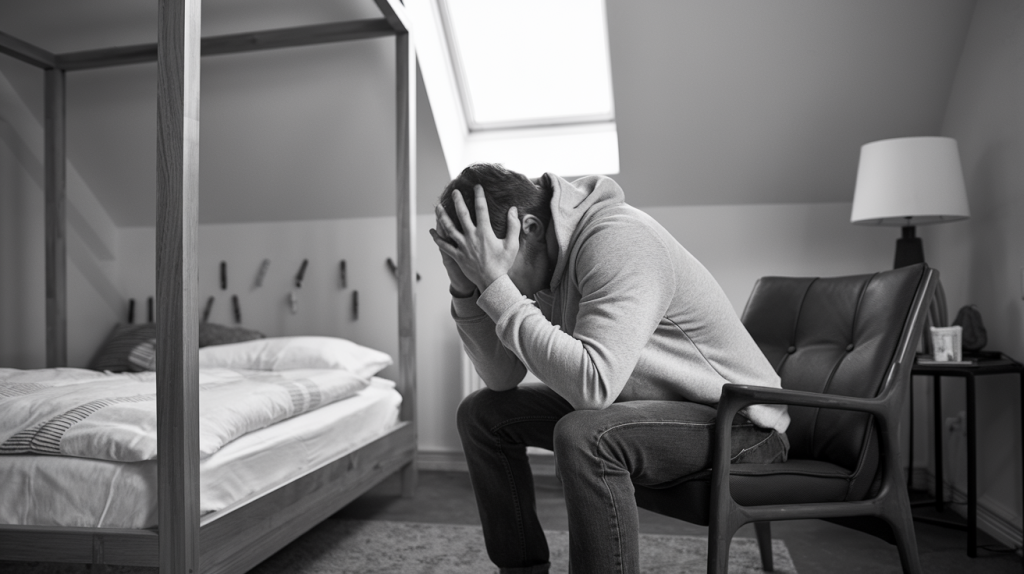The darkness of night often makes sadness feel heavier, especially when dealing with grief. Many people find themselves lying awake, memories flooding back with greater force after sunset.
This common experience connects countless individuals who feel their loss more strongly during quiet night-time hours.
The science behind night grief holds answers that can help make sense of these intense feelings.
This blog explains the reasons behind heightened night grief and offers practical ways to cope with these challenging hours.
You’ll learn about the connection between darkness and emotions, why the brain processes loss differently at night, and specific steps to help ease the weight of grief when the sun goes down.
The Science Behind Grief at Night

The human brain works in special ways when darkness falls. At night, the brain becomes more sensitive to feelings, making emotions stronger than during daylight hours.
When darkness comes, the body starts making more of a natural chemical called melatonin. This extra melatonin can make sad feelings feel bigger and more difficult to handle at night.
Scientists have found interesting patterns in how the brain works after sunset. The parts of the brain that deal with feelings and memories become more active at night.
It’s like these brain areas work overtime in the dark, making memories feel more real and emotions more powerful.
The lack of sunlight does more than just signal bedtime – it starts a chain reaction in the brain.
Different brain chemicals, which control mood and feelings, begin to shift. The brain’s emotional thermostat gets more sensitive, making it harder to keep feelings steady.
Inside the brain is a tiny part called the pineal gland. It works like a darkness detector.
When it senses night has fallen, it releases specific hormones. These hormones make people more tuned in to their feelings, which can make grief feel stronger.
Scientists also found that the brain processes difficult emotions differently at night. Without the distractions of daylight activities, the mind focuses more on inner thoughts and feelings.
This focused attention, combined with the brain’s nighttime activity patterns, can make grief feel more intense.
Psychological Factors for Night Grief

Here are some key psychological factors that contribute to the complexities of divorcing a narcissist. Understanding these can help you guide the emotional and mental challenges that arise during the process.
1. Reduced Distractions and Mental Space
When night falls, the usual buzz of daily activities slows down. The phone stops ringing, emails pause, and work responsibilities fade away.
This sudden drop in external activities creates a mental space that often fills with deeper thoughts.
The mind, no longer occupied with tasks and to-do lists, naturally drifts toward personal reflections.
This quieter environment allows suppressed emotions to rise to the surface. The difference between a busy day and a quiet night can seem intense, especially when coping with loss.
The brain, accustomed to constant stimulation during the day, suddenly finds itself in a slower, more contemplative state.
This shift from external focus to internal processing can make grief feel more pronounced and harder to ignore.
2. Heightened Emotional Processing
The night hours bring a natural increase in emotional sensitivity, and the brain is freed from processing daily tasks, and dedicates more resources to working through feelings and memories.
This increased emotional processing power means that feelings of grief can become more intense and vivid.
Thoughts that might stay in the background during busy daylight hours move to the forefront of consciousness.
The brain’s emotional centers become more active, making both happy and sad memories feel more powerful.
Feeling more aware of your emotions can make the weight of loss seem even heavier at night compared to during the day.
3. Social Isolation Impact
Nighttime naturally reduces opportunities for social connection. Friends and family are less available for calls or messages, and the usual sources of social support might be sleeping.
This decrease in social interaction can create feelings of being alone with grief.
The contrast between daytime social connections and nighttime solitude becomes more noticeable when processing loss.
Support systems that help during the day might feel out of reach at night. The physical separation from others can make emotional distances feel greater, intensifying feelings of isolation.
This reduced access to social comfort can make managing grief feel more challenging.
4. Memory Intensification
The quiet environment of the night creates perfect conditions for memories to surface with greater clarity.
Without the background noise of daily life, recollections become sharper and more detailed. Past moments replay in the mind with increased emotional impact.
The brain’s natural tendency to process memories becomes stronger in the stillness of night.
Small details about lost loved ones might suddenly feel more vivid and immediate. These enhanced memories, while precious, can also make the reality of loss feel more acute.
The silence of night allows these memories to play out without competition from other mental activities.
5. Emotional Reflection and Awareness
Nighttime creates a unique environment for deep emotional reflection. The mind naturally turns inward, increasing awareness of feelings and thoughts.
This heightened state of reflection can make emotional experiences feel more intense and immediate.
The brain’s processing of grief becomes more focused without external distractions. Self-awareness increases during these quiet hours, making emotional responses feel stronger.
The natural human tendency to examine feelings and experiences becomes more pronounced at night.
This deeper level of emotional processing can make grief feel more present and powerful.
The Role of Sleep and Fatigue

Physical and mental tiredness at the end of the day can make it harder to manage difficult emotions.
When the body is tired, it becomes more challenging to use healthy coping methods. Lack of sleep can also make feelings of sadness more intense, creating a cycle where grief disrupts sleep, and poor sleep makes grief harder to handle.
The brain’s ability to regulate emotions decreases with fatigue, making it more difficult to process grief in a balanced way.
This can lead to increased anxiety and heightened emotional responses during nighttime hours.
Sleep deprivation affects the amygdala, the brain’s emotional control center, making it harder to manage difficult feelings.
The natural daily rhythm of hormone production can also influence how intensely grief is experienced, with stress hormones often peaking in the evening hours.
Coping Strategies for Grief at Night

Below is the list of certain coping strategies for grief at night you can consider:
- Establish a Gentle Bedtime Routine: A structured bedtime routine can bring comfort during difficult nights. Activities like reading, listening to soft music, or journaling help relax the mind before sleep.
- Create a Peaceful Sleep Environment: A calm bedroom setup with dim lighting and comfortable bedding supports better rest. A clutter-free and cozy space can ease anxiety and promote relaxation.
- Seek Nighttime Support: Connecting with friends or joining online support groups can reduce feelings of isolation. Knowing others understand your grief can offer comfort and reassurance.
- Plan for Difficult Moments: Having a strategy for overwhelming nights, like keeping a journal or a list of calming activities nearby, can provide a sense of control and emotional relief.
- Maintain a Regular Sleep Schedule: Sticking to a consistent sleep routine helps regulate mood and emotional balance. Even during grief, a steady schedule promotes long-term well-being.
- Use Relaxation Techniques: Deep breathing, gentle stretching, or meditation before bed can help soothe the body and mind. These techniques make it easier to transition into sleep.
- Surround Yourself with Comforting Items: Keeping meaningful objects, photos, or memorabilia nearby can provide a sense of connection. These reminders can offer emotional support during tough nights.
- Acknowledge Night Grief as Normal: Understanding that grief often intensifies at night can help ease stress. Accepting these emotions as part of the healing process makes them feel less overwhelming.
Conclusion
Grief at night presents unique challenges, yet understanding its patterns helps make these difficult hours more manageable.
The combination of biological changes, fewer distractions, and natural reflection time explains why loss feels more intense after dark.
By recognizing that heightened nighttime emotions are a shared experience, people can feel less alone in their grief.
Simple steps like creating peaceful bedtime routines, maintaining sleep schedules, and finding nighttime support can make a real difference in handling these feelings.
Remember that processing grief takes time, and its intensity during quiet hours is a normal part of healing.
With better understanding and practical coping tools, the weight of nighttime grief can become lighter to bear.
Frequently Asked Questions
What are the Symptoms of Delayed Grief?
Physical signs include sleep problems and tiredness. Mental signs show up as sudden sadness, anger, guilt, or feeling numb to emotions months after a loss.
How Long Does Traumatic Grief Last?
Traumatic grief has no fixed timeline. Most people start feeling better after 6-12 months, but healing periods vary based on personal circumstances and support.
What Stage of Grief is Usually the Longest?
Depression tends to be the longest stage of grief. People often spend extended time processing their loss and adjusting to life changes during this phase.








